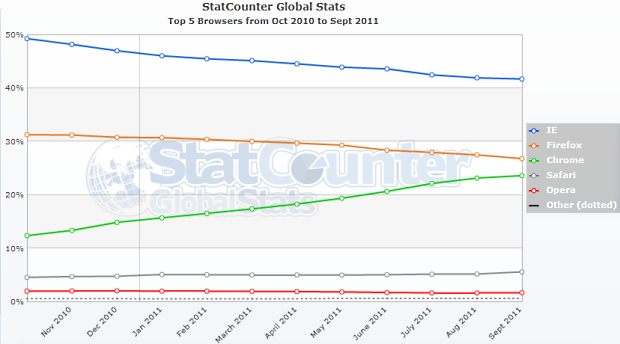Chrome could overtake Firefox by 2012

As Internet Explorer remains the king of all web browsers, upcoming star Google Chrome could be set to take over Firefox as the long-running second place browser.
According to web tracking company StatCounter, Chrome could take over Firefox as early as the upcoming holiday season, but more realistically early 2012.
For September, Chrome's global marketshare reached 23 percent, while Firefox had nearly 27 percent. Microsoft's Internet Explorer browser still leads the way with just over 41 percent.
But as Internet Explorer and Firefox continue to lose share of the global browser share, Chrome is accelerating at a rate of nearly 10 percent a year.

Chrome's user base has climbed at an incredible rate, as one of the fastest growing browsers in history.
Google Chromebooks, however, have had little effect on the browser's overall marketshare. Logically, should the web browser do so well, captivating the eyes of hundreds of millions worldwide, the hardware-driven extension to the web browser, Google's Chrome OS would do well also. But sales have been slow, and enterprises and schools have been reluctant to adopt the new technology.
Firefox has dwindled in the past few months, particularly with its new versioning structure. While Chrome offers a rolling update service, seemingly without the end-user even noticing, Firefox users are asked to upgrade at near six week intervals in apparent major upgrades to the browser.
While Google users experience no break in service, end Firefox users are asked to upgrade each time -- making it problematic for enterprises, which often requires administrator intervention.
Having said that, in Europe at least, Internet Explorer alternatives show impressive competition against Internet Explorer.
Last year, Microsoft was forced by European regulators to roll out a 'browser ballot' to Windows users, which affected users with Internet Explorer set as the default browser. A slap on the wrist for Microsoft, it allowed fair competition across the continent, giving Europeans the choice of an alternative browser, which alone negatively impacted Microsoft's share in the European browser market.
Related:
- Chrome overtakes Firefox in UK browser share
- Firefox 4 and 7 to be released before 2011: Too much, too soon?
- Chromebooks are dead, they just don't know it yet
- Three fixes Chromebooks need to succeed
- Internet Explorer should worry about Chrome, not Firefox: Blame Europe?
- Google Chrome continues its rapid rise, IE and Firefox fall